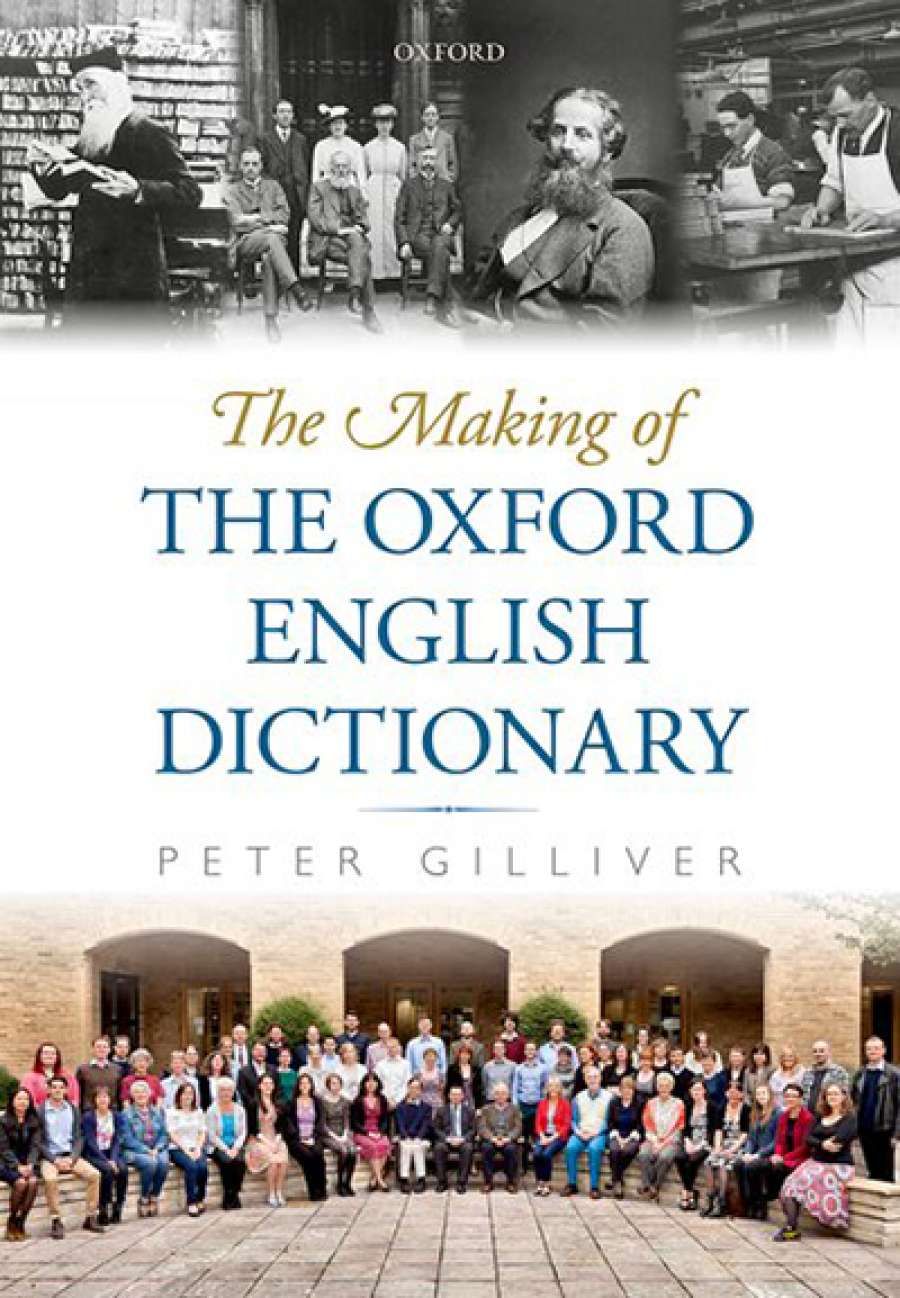
- Free Article: No
- Contents Category: Language
- Custom Article Title: Bruce Moore reviews 'The Making of the Oxford English Dictionary' by Peter Gilliver
- Custom Highlight Text:
There have been popular accounts of the making of the Oxford English Dictionary, especially Simon Winchester’s The Surgeon of Crowthorne (1998) and The Meaning of Everything (2003), and there have been more scholarly accounts, such as ...
- Book 1 Title: The Making of the Oxford English Dictionary
- Book 1 Biblio: Oxford University Press
In the account of the first edition, there is abundant evidence for a history of Hogwartsian dimensions: the setting is the medieval university town of Oxford, where the supremely wise magician-lexicographer Dumbledore-Murray trains a band of magicians to produce a work of overwhelming national significance, all lined up against the shadowy figures of the ‘Delegates’, that Oxonian term for the group of academics who control the publication of the University Press’s books, and who work under the unreasonable belief that books should be published according to an agreed timetable and budget, with the text limited to an agreed number of pages. When Murray came on board in 1879, the plan was for a four-volume work of 6,400 pages to be completed in ten years; it took fifty years, ten volumes, and 15,490 pages.
One of the strengths of Gilliver’s history, however, is that it offers nuanced assessments of all participants: Delegates and lexicographers, significant players such as Frederick Furnivall (of the Philological Society, the original sponsor of the project), and even volunteer contributors. In so doing, he brings to life the drama of this enterprise in ways that show how difficult it was for all sides. Indeed, there were also many professional and personal tensions among the lexicographers themselves. While it may not be obvious to the casual user of the dictionary, the different editors produced entries of differing kinds and qualities.
Murray certainly had cause for complaint about the way he was treated at Oxford. He was an outsider, a Scot who was not university educated. During his period as editor, he was twice denied a fellowship at Oxford colleges. He was deeply offended by the fact that the Delegates continually interfered in editorial matters – for example, suggesting deletions of particular words or classes of words (compounds and derivatives, technical words, regional words), or protesting at the use of illustrative quotations from newspapers – in ways that demonstrated their ignorance of the lexicographical task in which he was engaged. Murray died in 1915 and did not live to see the project completed; the last word he worked on was twilight. We are left with an overriding sense of Murray’s clarity of vision right from the beginning of his editorship – he knew what the dictionary should be, and he triumphantly put that knowledge into effect.
 James A.H. Murray (Oxford University Press)Many anecdotes bring to life the social environment in which the dictionary was produced. Murray discovered missing material for the section ‘Pa’ in a stable in Ireland, where it was being used ‘to light fires or rub down horses’. The ironically titled Scriptorium (in fact a corrugated-iron shed), constructed at the back of Murray’s Oxford house, in which much of the editing and sorting of quotations was done, had to be sunk two feet into the ground so that it did not ‘injure the outlook’ of the next-door neighbour, a Professor of English Law; the consequent dampness of the building led to illness of varying degrees of seriousness for all who worked there. In the preparation of the first supplement, someone deleted Bradley’s entries for lesbian and lesbianism, which prompted him to protest: ‘Lesbianism is no doubt a very disagreeable thing, but the word is in regular use, & no serious Supplement to our work should omit it.’ They omitted it anyway.
James A.H. Murray (Oxford University Press)Many anecdotes bring to life the social environment in which the dictionary was produced. Murray discovered missing material for the section ‘Pa’ in a stable in Ireland, where it was being used ‘to light fires or rub down horses’. The ironically titled Scriptorium (in fact a corrugated-iron shed), constructed at the back of Murray’s Oxford house, in which much of the editing and sorting of quotations was done, had to be sunk two feet into the ground so that it did not ‘injure the outlook’ of the next-door neighbour, a Professor of English Law; the consequent dampness of the building led to illness of varying degrees of seriousness for all who worked there. In the preparation of the first supplement, someone deleted Bradley’s entries for lesbian and lesbianism, which prompted him to protest: ‘Lesbianism is no doubt a very disagreeable thing, but the word is in regular use, & no serious Supplement to our work should omit it.’ They omitted it anyway.
Work on the third edition began in the early 1990s, and although a ‘wizard’ 2005 publication date was planned, later extended to 2010, a completion date is no longer mentioned. For users, the online electronic form is the most obvious change, with new and revised entries being added regularly across the whole dictionary. An even more significant change is the policy to move from a British English dictionary (with voices from some of the former colonies) to a truly World English dictionary – ‘English in all its varieties’.
Whether or not the dictionary will ever appear again in hard copy is uncertain. Gilliver suggests it might, but it is impossible to know at this stage. The history of the Dictionary should warn us that any firm predictions about such matters are mere dorbellism, foziness, jobbernowlism, lourderie, sottage, and sumphishness.


Comments powered by CComment